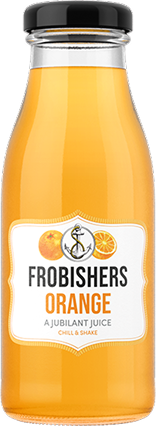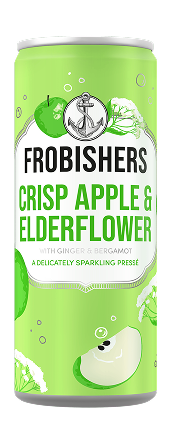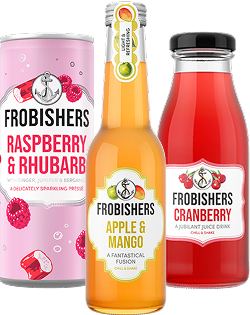What does it mean for Frobishers as a B Corp?
Last autumn, Frobishers became a certified B Corporation, or B Corp for short. Hear directly form our Operations Manager and B Corp Co-Chair Becca about what that means for Frobishers.
For anyone who hasn’t heard of this, can you explain what it means?
B Corp Certification means that a company has been verified as meeting high standards for social and environmental impact, that it has made a legal commitment to stakeholder governance, and that it is demonstrating accountability and transparency by disclosing their performance publicly. Simply put, it means we are legally bound to put people and planet up there with profit and to use business as a force for good.
The certification process measured our impact across five key areas: Governance, Workers, Community, Environment and Customers. Every part of our business was rigorously scrutinised by the B Impact Assessment (or BIA for short). The average score for businesses completing the assessment is 50.9, and to be B Corp certified, a business must achieve a score of 80 or above. We were pleased to achieve a score of 86.9.

What inspired us to pursue B Corp certification, and how does it reflect our brand’s values?

There was a growing awareness of the B Corp movement among our customer base, and when we had a look into what it, we found that the standard aligned pretty well with our existing business and brand values. We put a strong emphasis on transparency with our customers, suppliers and staff, on sourcing ethically, on measuring and reducing GHG emissions, and on being a great business to work for. B Corp felt like it would be confirmation from an independent, trusted source, that we care about our team, our local community, our customers and our planet.
How long did the process take from start to finish?
We decided to pursue certification in January 2024, submitted our B Impact Assessment in May and were certified by September. We’d heard stories of it taking years, but we were pleasantly surprised that it only took 4 months from submission to certification. It was a rigorous process that took a fair bit of time each week, but the more prepared you are to evidence your answers to the BIA, the quicker the process.
How has certification influenced our approach to how we do business?
We were already informally doing many of the things that B Corp certification requires, but the process made us formalise practices and procedures to ensure that they are carried out across the whole business and that they remain in place regardless of any people changes. It brings doing good business more to the front of your mind and raises the bar for how we operate.
In every decision we make, we are legally bound to balance making profit with doing what is best for people and the planet too. For example, we now consider carbon emissions in our procurement decisions, not just product or service quality and cost. Likewise, whereas we might previously have booked a truck based on soonest availability and price, we now look for one using HVO fuel as our first priority.
We’re a pretty informal team, so one of the biggest changes was formalising things like flexible working policies, professional development, a staff satisfaction survey, and surveying employee engagement and attrition rate. We’ve taken something that was important, but fairly intangible for us – the idea of treating employees well – and made it more data driven, giving us specific areas to focus on.
It’s not something where you certify and then leave it there like you might with an audit; it commits us to continuous improvement. We publish annual impact reports, so we have to keep sustainability and good business as a high priority so that we have something new to write about each year!
What tangible benefits have we seen since becoming a B Corp—such as customer loyalty, partnerships, or operational efficiencies?
It’s a little early to know if we’ve won any new business specifically because we are a B Corp, but we are certainly seeing more and more customers asking about B Corp certification as a standard question on new supplier forms. The movement seems to be becoming more recognised and our existing customers have been really pleased when we have shared news of our certification with them. Some of our wholesale customers have done specific features on us because we became a B Corp, so I think it’s helped increase customer loyalty and brand awareness.
The team are also really proud of the badge of honour and it’s great to mention from a recruitment point of view, as the certification demonstrates that we look after our team well.
A significant benefit has been joining a community of like-minded businesses. Another local B Corp dropped round with some gifts for everyone almost as soon as we had certified to welcome us to the community. We joined, and I am now actually co-chairing, the Devon ‘B Local’ who hold regular networking events. All the B Corps we have come across are really willing to share best practice and give us new ideas on how to increase our impact.
What advice would you give to other SME businesses considering B Corp certification, and what key lessons did you learn along the way?
Have a go at completing the B Impact Assessment and see where you sit already. There is no cost involved to start with, and you don’t have to submit anything, so you can just drill into the details about what being a B Corp involves. It will likely take you a few hours to go through, but it’s a good way of understanding if it’s for you. When we first completed the BIA, we sat somewhere around 50 points. We then pulled out a spreadsheet with questions that stood out as potentially achievable for us, the points we could gain if we put new practices in place and kept working on those until we got over 80 points!
Connect with other B Corps, or a B Local if there is one in your area. They’ll be the best people to support you with tricky questions and can connect you with B Leaders who will lead you through the certification process if that’s something you require.
Certification is challenging and takes a lot of work. It’s probably a good idea to have one person who is focused on it and importantly , someone who is empowered and has the time to make sure things are progressing. After you are certified though, it needs to sit with the highest level of management. Those at the very top of the business need to believe in its values for it to stick.
Lastly, it’s worth noting that the standards are changing from 2026, and in some respects are getting tougher. Getting your assessment in this year gives you a better chance of getting specific advice on tricky questions from other businesses who have already certified.








